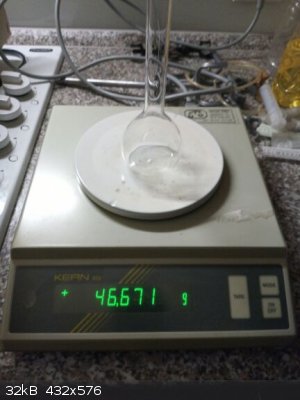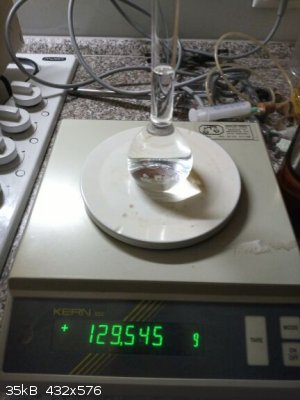beeludwig
Harmless

Posts: 30
Registered: 7-5-2019
Member Is Offline
|
|
Salting out alcohols
I'm trying to salt out alcohols either a 50:50 mix of ethanol or isopropanol and neither is working. It is one of the simplest procedures in
chemistry and I'm not sure what's going wrong.
I created a 1:1 ratio of anhydrous ethanol and tap water and mixed them together. Then I added table salt until no more would dissolve. Then I mixed
them up but there's been no separation of layers. Is there something in the tap water or in the table salt that's interfering? But I can't think of
any reason for it. One time I tried making a saturated salt solution first and then mixing, but the salt precipitate out instead of the ethanol. I
feel like I'm missing something blindingly obvious. Any ideas?
|
|
|
woelen
Super Administrator
        
Posts: 8012
Registered: 20-8-2005
Location: Netherlands
Member Is Offline
Mood: interested
|
|
I think that NaCl is not sufficiently soluble. Try with adding NaOH. E.g. take 5 ml of isopropanol, 5 ml of water, mix, and then add solid NaOH.
Probably you salt out some of the isopropanol.
|
|
|
happyfooddance
National Hazard
   
Posts: 530
Registered: 9-11-2017
Location: Los Angeles, Ca.
Member Is Offline
Mood: No Mood
|
|
For ethanol, use potassium cation salt (K2CO3, KCl).
For isopropanol, use sodium cation salt (NaOH, NaCl).
With a 50/50 etOH/water you will need to use a very large proportion of salt, and it will be well worth your time to powder it finely.
|
|
|
MrHomeScientist
International Hazard
    
Posts: 1806
Registered: 24-10-2010
Location: Flerovium
Member Is Offline
Mood: No Mood
|
|
NaOH has worked for me. To dehydrate 91% isopropanol (IPA), I added in a good amount of NaOH (10's of grams to a regular store-bought bottle of IPA)
and shook for a few minutes. The hydroxide pulls out almost all of the water into a separate layer that can be easily removed. You then have to
distill the IPA to get rid of the NaOH, and the result is very pure and very dry alcohol.
|
|
|
Fery
International Hazard
    
Posts: 1015
Registered: 27-8-2019
Location: Czechoslovakia
Member Is Offline
|
|
salting out isopropanol using NaCl
Yesterday and today I salted out isopropanol (IPA). It was quite time expensive and 99,8% IPA is cheap (4 EUR per 1 l), but the method could be
helpful for chemists who would like to recover IPA instead of producing wastes.
I found 20 years old medical disinfectant in 5 l plastic tank. It contained 70 g of isopropanol per 100 g of disinfectant which was very suitable to
perform medium scale experiment (I wouldn't dilute pure IPA with water just to perform the experiment).
I mixed 5 l of the 70 wt. % IPA with 1 kg of NaCl and shook the mixture about 10 times during 1 hour. Then I let it to settle overnight. Not the whole
NaCl dissolved, about 100 g remained at the bottom, so the mixture was saturated with NaCl. The next day I separated 2 liquid layers using separatory
funnel. I got 2,4 l of IPA as upper layer and 3,0 l of mixture of IPA+H2O+NaCl as bottom layer. I distilled the bottom layer from which I obtained
extra 650 ml of IPA, I stopped collecting distillate when T raised to 100 C. Because the T was higher than b.p. of IPA (82,5 C) I was curious how much
water could be removed by salting out these 650 ml, so I added 20g of NaCl to the 650 ml of distillate and shook few times during 1 hour. NaCl did not
dissolve too much and I was able to obtain only 5,5 ml of liquid bottom layer (plus few ml adhering to NaCl crystals).
So it is worth to distill the bottom layer (20% increase of yield) but not to salt out the distillate obtained from it using NaCl again even you stop
the distillation just before 100 C.
Next steps to do - distillation of the total 3 l of IPA to remove traces of NaCl, salt it out using K2CO3, layers separation and final distillation.
NaCl as well K2CO3 could be recovered and reused again.
For salting out ethanol the NaCl is not powerful enough and K2CO3 should be used.
|
|
|
Fery
International Hazard
    
Posts: 1015
Registered: 27-8-2019
Location: Czechoslovakia
Member Is Offline
|
|
Finally I had a time to distill the salted out IPA. I do not have densitometer (well I do have about 5 of them, but only for ethanol) either
pycnometer. So I used 100 ml volumetric flask. The calculated density 0,829 g/ml. According this IPA/water density table it should be 85,5 wt % which is close to the azeotrope (87,7 wt%).
I definitely suggest not to salt out IPA using NaCl, but to use column distillation (time savings, higher yield, etc).
 
|
|
|